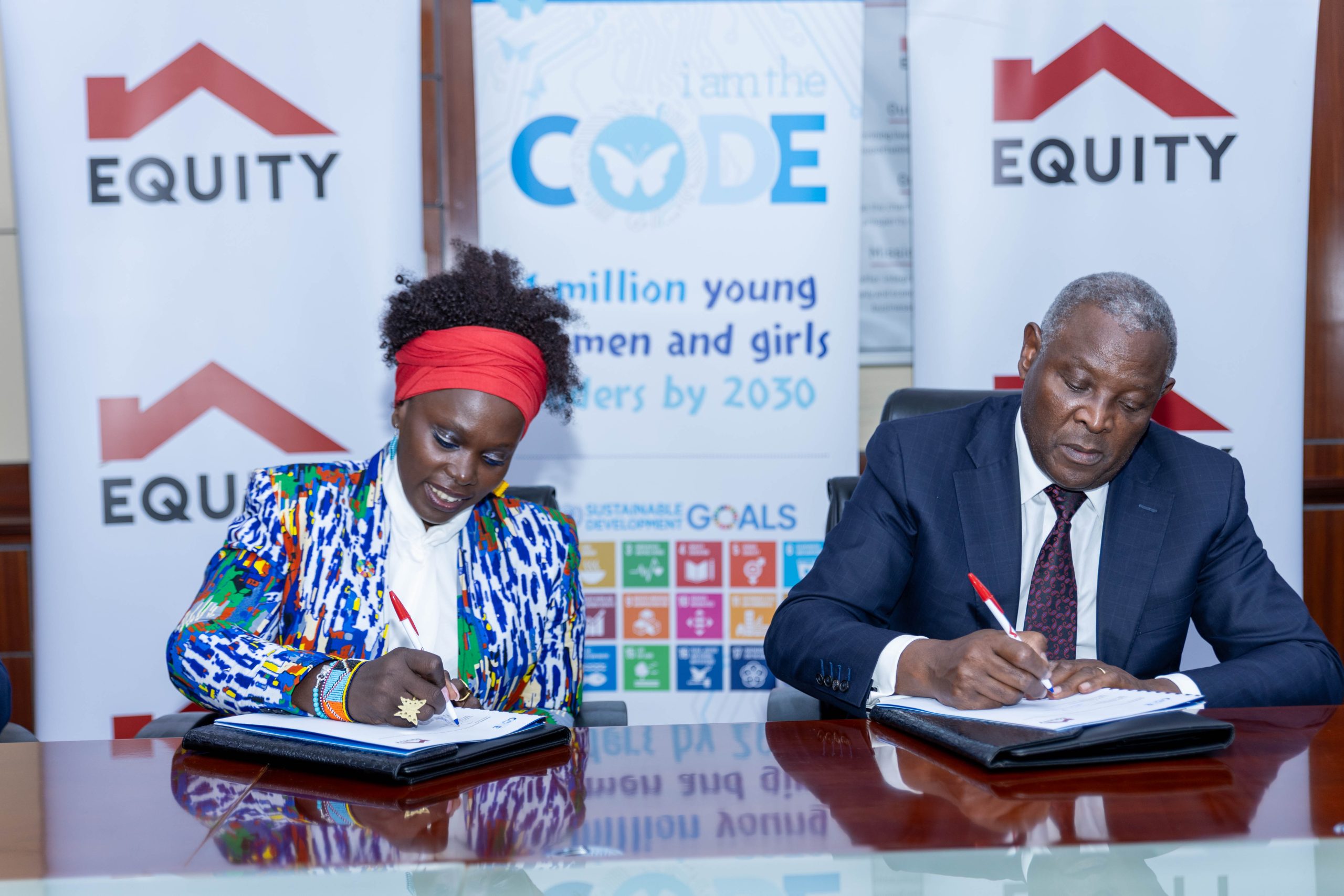IAMTHECODE AND EQUITY GROUP FOUNDATION SIGN STRATEGIC PARTNERSHIP TO ADVANCE DIGITAL SKILLS AND AI LITERACY ACROSS AFRICA
Nairobi, Kenya, 4th November 2025 – iamtheCODE, the world’s first African-led global movement advancing STEAMD (Science, Technology, Engineering, Arts, Mathematics, and Design) education, and Equity Group Foundation (EGF) have signed a strategic partnership to empower 600,000 learners across Africa with essential digital and technical skills.
The partnership will roll out a comprehensive Digital Academy comprised of over 65,000 free online upskilling and certification resources through the iamtheCODE Program, combining STEAMD curriculum, leadership workshops, mentorship opportunities, and open-source online courses. The program is designed for inclusive access for women, girls, and youth, with particular emphasis on access for underserved communities.
Building on Equity Group Foundation’s successful initiatives, such as Wings to Fly and the Equity Leadership Program, which have supported over 60,000 young people through secondary education and 29,515 in public universities, the partnership will expand its impact to include refugees and vulnerable communities, empowering them to achieve economic independence.
Speaking at the signing of the MoU, Dr. James Mwangi, Executive Chairman of Equity Group Foundation, emphasized the partnership’s critical role in equipping Africa’s youth with future-ready skills. He noted that while education and certificates are common, employers increasingly demand work-ready skills such as AI, coding, data analytics, and data engineering, which remain scarce even in the formal sector.
“The coming together with iamtheCODE and Equity Group is a huge opportunity for us to enhance and expand our capacity to support young people, not just with education, but also with technical skills, what one would call the skills of the future. Employability is increasingly becoming difficult if you don’t have the right skills. Africa will not take the same path that other continents took. It will leverage and leapfrog on technology, positioning itself to not only catch up but to easily be ahead of the rest of the world in innovation and economic transformation,” said Dr. Mwangi. “As a continent, we have the advantage of a youthful population, with a mean age of 18. They are digital natives and will quickly embrace the skills of their time. They will be well-prepared as they finish school with coding skills for the job market.”
He added, “IamtheCODE is providing access to 600,000 licenses, meaning we can reach 600,000 young people with technical skills that could allow them to live in Africa but work for the rest of the world, because coding skills are scarce globally. It is clear that this partnership is not just about training but about creating opportunities. These skills will enable young people to compete, earn a livelihood, and contribute meaningfully to their families, communities, and Africa’s economic transformation.”
iamtheCODE, which operates in 89 countries, offers over 65,000 courses, making it one of the most comprehensive and scalable platforms for digital skills development. With a goal of reskilling 1 million female learners of all ages globally by 2030, the program is designed to meet the growing demand for employability skills worldwide. The platform also includes a mentoring component, providing learners with access to global networks and expertise to guide their professional growth.
Lady Mariéme Jamme, Founder and CEO of iamtheCODE, emphasised the urgency of upskilling Africa’s youth, underserved communities, and refugees with the technical, life, and soft skills required to thrive in a rapidly changing world. “We are in emergency mode in Africa right now. We need to make sure that our people are skilled. We cannot just sit and wait. These young people, along with the communities and refugees Equity is serving, are eagerly waiting for the opportunity to gain essential skills. This partnership with Equity Group represents the spirit of collaboration Africa needs. Together, we will ensure that every girl, no matter where she comes from, can learn, innovate, and lead in the digital economy.”
She also highlighted the transformative power of skills in restoring dignity and creating opportunities for young people. “We need to restore dignity to people. When people have dignity, they gain skills, and with those skills, they achieve freedom. To truly emancipate our people, we must equip them with the tools to succeed. With the right skills, individuals can apply for jobs, earn a livelihood, and achieve financial independence. The iamtheCODE platform has the potential to train many data clerks, Excel specialists, and cybersecurity professionals,” she said.
In addition to technical training, the program focuses on equipping learners with essential life skills such as collaboration, empathy, and teamwork to ensure they are well-prepared for the modern workplace. Equity Group will support participants by offering loans to purchase tools like computers, providing internships, and offering startup capital for those looking to launch their own businesses. It will also connect graduates of the program to its 23 million customers, helping small businesses digitize their operations and drive broader economic growth.
Additionally, iamtheCODE’s evidence-based approach will track and showcase the program’s success, measuring the number of coders, project managers, and cybersecurity experts trained to ensure accountability and impact.
This collaboration aligns with Kenya Vision 2030, the African Union’s Agenda 2063, and the United Nations Sustainable Development Goals (SDGs), particularly SDG 4 (Quality Education), SDG 5 (Gender Equality), and SDG 9 (Industry, Innovation, and Infrastructure). It also aligns with Equity’s vision of driving private sector–led development financing and its Africa Recovery and Resilience Plan (ARRP). The Plan aims to drive economic recovery and development across the continent, particularly in key markets where Equity operates, including Kenya, Uganda, Tanzania, Rwanda, South Sudan, the Democratic Republic of Congo, and Ethiopia, where it established a Commercial Representative Office.
